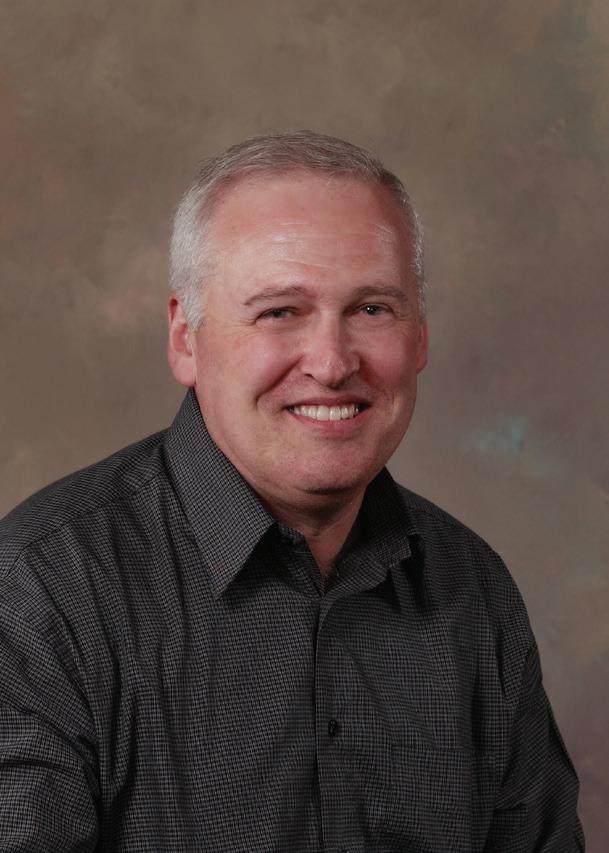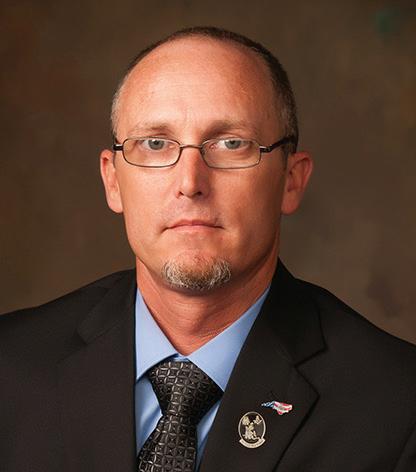
7 minute read
SHOAF NAMED ADJUNCT FACULTY OF THE YEAR
By Megan Crotty
Donald Shoaf may have retired from Randolph Community College in May 2022, but he left an indelible mark on the College. Shoaf spent 30-plus years dedicating himself to the medical imaging profession, much of that as a teacher, earning him the 2022 Adjunct Faculty of the Year Award.
Advertisement
“You can tell that Don’s passion is to teach and mold minds,” one 2021 graduate said. “He wants to see you succeed, and he does everything within his power to help you as long as you put forth the effort to make that happen. He truly is one of a kind. He explains things in a way that is easy to comprehend and knows how to deliver instruction so that his lessons stick. I felt like I learned more in the classroom and lab with him than I ever could online.”
Shoaf earned the Forsyth Technical Community College Excellence in Teaching award in 1987 and the National Institute for Staff and Organizational Development Excellence Award in 1991. He also is an active member in the American Society of Radiologic Technologists, serving in various educational capacities including Associate Dean of Health Technologies/Department Chairperson, Radiologic Technology; Assistant Vice President/Dean of Health Technologies, Radiography Program Coordinator, Radiography Clinical Coordinator, and Radiologic Technologist, Clinical Imaging Manager.
The willingness to learn and a love of being a part of a talented team meant Matthew Needham could have started anywhere. Luckily for Randolph Community College, Needham was the Director of Safety and Emergency Preparedness when COVID hit. He was the perfect person for the job. For his tireless efforts to keep the College campuses safe, Needham was named the 2022 Staff Person of the Year.

Before RCC, however, his focus was more on forests than folks.
Needham graduated from N.C. State University with a Bachelor of Science degree in Forest Management. A certified arborist, he started a landscaping company, Remember Your Roots, in 2002 with his best friend since elementary school. The two worked mostly in Cary and Raleigh, doing everything from writing tree conservation plans to building water features to basic landscaping.
In the summer of 2008, Remember Your Roots was inundated with work — so much so that the business partners had trouble keeping up. That October, the recession hit, and everything stopped, including the small company’s contracts.
“We were at the point that summer where we were fixing to have to grow and take on some more debt and put on another crew because we couldn’t keep up,” Needham said. “We were fortunate that we did not. We were at a point where all our stuff was paid for, and it was easy for us to just walk away."
But that didn’t make leaving the business he built easy. “I miss parts of it — he and I working together," Needham said, "but the stress of the cash flow and having to drive over to Raleigh and Cary, I don’t miss.”
While his friend found a job as a grounds supervisor at Dorthea Dix Hospital, in 2009, Needham started at RCC as a groundskeeper in the Facilities Department. “It was bottom pay, but for me, at the time, I still had young girls, so it was more about the schedule than pay,” he said. “In the summertime, when I got off at three o’clock, I didn’t have anything that was on me. I was done. That schedule was a blessing. You have ball practices and stuff — I got to experience all that. There’s a lot more to life than money. In the community college system, I would imagine that’s true for a lot of people. You can go other places and make a lot more money, but when you’re in an environment that you like and you have a schedule that you like, you stay.”
When the state started looking at cutting energy costs by a third at all state agencies, Needham moved into a new role, Conservation Specialist, helping the College cut its energy consumption.
Then in 2016, Director of Safety and Emergency Preparedness Robert Graves was elected Randolph County Sheriff, opening the position. Needham quickly learned that he would be wearing many hats — some he didn’t even know about yet. While boasting environmental health and safety experience under his belt, his background wasn’t in security/law enforcement, emergency preparedness, human resources, or dealing with health issues.
“You’re going to have a steep learning curve coming in not having a background in law enforcement or emergency preparedness,” he admitted. “I continue to try and take [any classes] I can to get to be more comfortable with those roles that I have not had that experience with. One of the things we talk a lot about is silos. If you contain information in silos, when the silo head leaves, you’re in trouble. So, any time someone starts doing something — like in technology, and I didn’t come from technology — I say, ‘Show me. I want to see what you’re doing.’ I don’t know all of it, but I know enough.
“The job is constantly moving and changing. What you might think is the priority for that day might not be a priority at all and be moved to the bottom.” the SafeColleges platform which provides information on topics such as active shooter drills, fire extinguisher safety, CPR, sexual harassment, and email and messaging safety.
Needham consistently looks for the most cost-effective way to ensure the safety of RCC’s campuses while not sacrificing quality, helping in any way he can with pulling wire or doing installations himself. He also developed a proposal to transition to one School Resource Officer and contract officers, so there would be trained SROs on campus even on Saturdays.

“A lot of campuses have moved away from that sworn law enforcement officer on campus, using security hired by the college and/or contracted,” Needham said. “I prefer a ‘good gun’ on campus. Their presence means something.”
The variability of the job has meant taking workers compensation courses and security courses, as well as Federal Emergency Management Agency (FEMA) classes as part of his professional development. Always learning, Needham is sure to pass along his knowledge to keep RCC safe, offering active shooter training to faculty and staff and coordinating tabletop active shooter exercises with local law enforcement. In conjunction with Human Resources, he moved all the faculty and staff training to
Needham also investigated a mass notification system to put out alerts for anything from lockdowns to severe weather. The older system that RCC had didn’t allow integration with the existing technology on campus. So, along with the Information Technology Systems team, Needham researched other systems, eventually learning about Alertus from neighboring colleges. With the help of a “Safe in Seconds” grant, an Alertus program that provides the Alertus DesktopTM Notification at no cost to schools and nonprofits, the College gradually started adding Alertus hardware components.
“I make the best decision I can with the information I have on hand,” he said. “I always try to err on the side of safety. … We want to create a safety culture where people are involved. I cannot do it by myself. With faculty and staff using Alertus, people are integrated into our safety culture.”

Since upgrading, the Alertus System has been integrated with Rave’s SMS service, Cisco VoIP phones, and an outdoor speaker system. Several Alertus Text-To-Speech Interfaces are connected to speakers inside and outside Photography and speakers throughout CEIC (Continuing Education and Industrial Center) and the Clock Tower. Desktop activator buttons can send alerts for security, ambulance, mental health, or active shooter scenarios.
“The two-way desktop activator buttons allow us to distribute and receive information from our students, faculty, and staff,” Needham said. “Communication is critical, and we wanted to ensure we had a platform to facilitate the two-way street of delivering and receiving information.
“People want information, and if you don’t give it to them, they will find it elsewhere or make it up. It is essential to have a communication platform that delivers information in real-time; otherwise, you are behind the curve.”
Still, no amount of planning or preparation could have prepared Needham for March 2020 when everything, including the College, closed due to COVID. The pandemic put Needham at the front lines. As the go-to person for COVID issues, he called every person who had tested positive or had been exposed and listened to their concerns; followed up with those individuals; consulted with vice presidents, if needed, for a decision about the individuals; sent out emails, and documented everything.
COVID also tested Needham’s skills in mediation.
“We are duty-bound by general statute to create an environment that is free of known hazards. COVID is a known hazard,” he said. “We are duty-bound to provide that work environment for these people and this place for students to get an education. If we were to have a death on this campus because of it, we could be held liable for that. So, we have a duty to protect those who don’t even want to be protected. ... Everyone was on edge. It’s not like somebody had a black cowboy hat on, and you knew exactly who you’re dealing with. It just created tension everywhere, and I dealt with that because of my role.”
Now that restrictions have been lifted, Needham is tackling different issues like student mental health. He first broached the idea of having a mental health first aid team. Needham coordinated visits to other colleges so RCC faculty and staff could see what those institutions were doing, and those visits and discussions provided a wealth of ideas from which the College could draw. Today, RCC’s CARES team is managed by Student Services, and Needham still serves on the team. RCC also still has the mental health first aid team that he manages and coordinates.
Needham also is involved in the EHSI (Environmental Health & Safety Institute) and NC ACCSSO (Association of Community College Safety and Security Officials), sharing and learning best practices with his fellow safety and security directors.

“We discuss best practices,” he said. “I send what I’ve done to the group, because I would much rather take your stuff and make it mine than try and invent something.
“Still, what works for us doesn’t necessarily mean it works for other community colleges. And any time you implement a system, there will always be ways to improve. Even in fire drills. Somebody is going to find a weak spot somewhere. Every single time we do something, I always find this didn’t work, that didn’t work. This worked really good. That didn’t work so good. So, we go in and fix whatever issues we can at that point that we’ve identified.”
Needham recently completed his master’s degree in Leadership from Liberty University. He also participated in the President’s Educational Leadership Academy (PELA), Advanced PELA, and Leadership Randolph.
“The reason why I have continued to grow here at RCC is because of the atmosphere,” he said. “The team down in facilities — it truly is a team. They have that kind of atmosphere. They are supported by their director. We are supported by the Vice President. It’s such a great place to work.”











